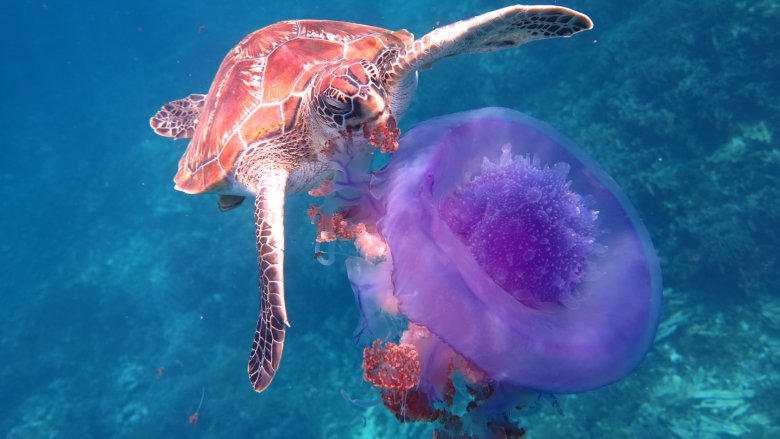What Animals Eat Jellyfish?
The description of a jellyfish sounds like the kind of insult Neil Degrasse Tyson would sling at someone he held in utter contempt: "You're an amorphous gelatinous sack, your mouth is your anus, and your nervous system is as elementary as your life's ambition to drift and eat."
Yet, while only about 5 percent of a jelly's body is solid mass — with the rest being water according to the National Ocean Service – they're actually eaten by a good deal of species. National Geographic says that while they were once thought to be a nutritional cul-de-sac since they're basically just water, jellies are like snack foods for ocean dwellers: easy and abundant. So what they lack in quality they make up in quantity.
The article lists leatherback turtles as highly reliant on jellyfish for food, along with penguins, albatross, tuna, crabs, ducks and oceanic microbes. Shout out also to the abysmally ugly ocean sunfish, which is a famed jellyfish-consumer according to BioExpedition.
The Seattle Times cites research saying that while jellies comprise only one to two percent of a penguin's energy needs, those tuxedoed birds will pass up dietary staples like krill to seek out those gaseous sacs, hinting at other possible health benefits. Select jellyfish parts like the gonads — yes, that's right, jellyfish gonads — are actually rich in fats and proteins, the article says, so jellyfish consumption could be thought of as a nutritional supplement.
Or perhaps all these creatures just like the unique texture and flavor. Futurism.com says that a team of Danish scientists figured out how to turn jellyfish, already considered a delicacy in parts of Asia, into potato chips.
Sounds crazy, but similar to seaweed and kelp chips, it's a sustainable low calorie food source, so why not? As it turns out, much of the animal kingdom is eating jellyfish thanks to their abundance and ease of capture. Mammals, birds, fish and amphibians all partake, and soon you might too. Just avoid the stingers. Maybe go straight for the gonads, though.
